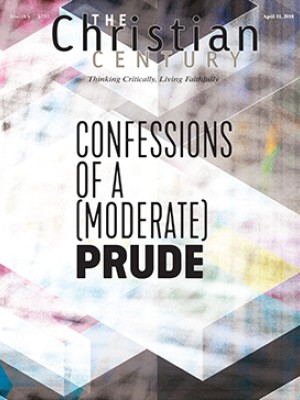April 29, Easter 5B (Acts 8:26-40; 1 John 4:7-21; John 15:1-8)
We are divided. We do not abide each other well.
The province in which I live has halted the import of wine from our neighboring province. More than 17 million bottles came to Alberta tables from British Columbia last year. That’s a lot of grapes, a lot of vines, and 70 million dollars. At dispute is the westward export of Alberta energy products through the Trans Mountain pipeline expansion. British Columbia has imposed restrictions on bitumen shipments that would flow through the expanded pipeline from Alberta to the West Coast. #PinotNotPipelines, says the Twitter slogan.
Transporting gas, oil, and bitumen creates ecological risks for rivers, wildlife, and people. It’s an enterprise fraught with political acrimony. Across the continent we are on opposite sides of pipeline rallies, demanding that government and industry hear our arguments.
Read our latest issue or browse back issues.
We are divided. We do not abide each other well.
Yet energy fuels our abundant lives: heat and cooling in our homes, Internet access for the school library, a tank full of gas to drive into the sunset on holidays. Good food and drink are part of our abundant life, too. They enhance friendships, make family gatherings memorable, bring joy to neighborhood potlucks, and create community at church.
Jesus is the true vine, we read; his Father is the vine grower, the farmer. The vine has branches, and that’s us. We get to blossom in the spring sun, bear fruit in the late summer, furnish the world with sweetness of Riesling and fullness of pinot. A vine grower needs a vine, and a vine needs branches. We’re all in it together.
I wish. I pray for wisdom about my pastoral role in a congregation that includes both ecological activists and oil and gas engineers. I pray for guidance as I decide whether to purchase California wine for a change. I pray for companionship as I prepare to preach on abiding in Jesus when I am aware that my resources for my own daily needs are pretty sweet.
The model of our faith is the Trinity, the three persons, being in it together—moving, dancing, loving. From this pattern I try to live in my congregation, inviting people to a Sunday lunch to talk over chili about solar and bitumen. I try to reach out to my colleagues candidly, as vulnerable as I really am and not as clever as I’d like to be. I try to be a blossoming branch on the vine. God only knows about the fruit.
“Abide in me, as I abide in you,” says Jesus in John. “Those who abide in love abide in God,” writes John in 1 John. If faith is about relationships, how do we live together? Families depend on employment in oil and gas. Families run vineyards and wineries. They are divided.
The bitumen, gas, and oil pumped from the ground hearken to our geological history. There’s a dividing line many feet down, a division in the rock, and it’s orange. It marks the end of the Cretaceous period—and of the dinosaurs—66 million years ago. Above this line is the current geological era, the Cenozoic.
There’s a dividing line like that in the book of Acts. After the first appearance of Saul but before the seismic shift of his conversion, the Ethiopian eunuch comes on the scene, seated in a chariot and reading Isaiah. He is a powerful man, in charge of the queen’s treasury. He is a black man. He is also identified with a sexual reference: a eunuch, set apart in the world of our ancestors in faith. This man is an important part of the Christian story; it is not complete without him.
This passage has been part of the common lectionary for a whole generation of preachers. It popped up in 1988, when the United Church of Canada was going through a dividing time, as harsh as petrified stone. It changed our character, and I wouldn’t go back. But it was rough. We decided that identifying as lesbian or gay would not bar a person from diaconal ministry. Those of us in ministry at the time carry grievous memories of how people, divided from one another, cut to the heart.
Philip’s baptism of the Ethiopian eunuch offered a grace-filled preaching point: all are welcome. As colleagues we leaned into each other and placed our feet behind pulpits. We were preaching in love to people expecting a seismic shift. One friend still recalls a parishioner storming out mid-sermon. We carry marks from these divisions.
The Ethiopian eunuch comes up soon after the resurrection, with the empty tomb on our minds. We ask one another, with Philip, Do you understand what you are reading? Do you know there’s a seismic shift coming? The world will change when all are welcome, when we lean on one another, when we trust the source of all life—the risen Christ, the God who is in it together with us. Then we’ll be reaching deep through the vine to our roots, trusting the strength of that vine and the care of the vine grower. Then we will abide each other well.
In the meantime I love my congregation, cherish my colleagues, and listen for wisdom. Or at least I try. And I pray that the parts of me that don’t try will get tossed into the fire with everything else that withers for lack of an abiding trust. I read Isaiah, drinking chardonnay on an airplane fueled by energy pumped from the deep recesses of the earth. I trust that wisdom will come with guidance from colleagues like Philip, and I wonder at a God who abides in the communities that foster division—and in my vulnerable leadership. I look at the label on the bottle and smile: Okanagan, British Columbia, Canada.






